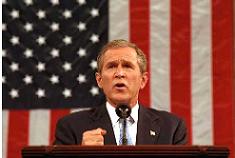In 5-year effort, scant evidence of voter fraud
 Five years after the Bush administration began a crackdown on voter fraud, the Justice Department has turned up virtually no evidence of any organized effort to skew federal elections, according to court records and interviews.
Five years after the Bush administration began a crackdown on voter fraud, the Justice Department has turned up virtually no evidence of any organized effort to skew federal elections, according to court records and interviews.
Although Republican activists have repeatedly said fraud is so widespread that it has corrupted the political process and, possibly, cost the party election victories, about 120 people have been charged and 86 convicted as of last year.
Most of those charged have been Democrats, voting records show. Many of those charged by the Justice Department appear to have mistakenly filled out registration forms or misunderstood eligibility rules, a review of court records and interviews with prosecutors and defense lawyers show.
In Miami, an assistant United States attorney said many cases there involved what were apparently mistakes by immigrants, not fraud.
In Wisconsin, where prosecutors have lost almost twice as many cases as they won, charges were brought against voters who filled out more than one registration form and felons seemingly unaware that they were barred from voting.
One ex-convict was so unfamiliar with the rules that he provided his prison-issued identification card, stamped “Offender,” when he registered just before voting.
A handful of convictions involved people who voted twice. More than 30 were linked to small vote-buying schemes in which candidates generally in sheriff’s or judge’s races paid voters for their support.
A federal panel, the Election Assistance Commission, reported last year that the pervasiveness of fraud was debatable. That conclusion played down findings of the consultants who said there was little evidence of it across the country, according to a review of the original report by The New York Times that was reported on Wednesday.
Mistakes and lapses in enforcing voting and registration rules routinely occur in elections, allowing thousands of ineligible voters to go to the polls. But the federal cases provide little evidence of widespread, organized fraud, prosecutors and election law experts said.
“There was nothing that we uncovered that suggested some sort of concerted effort to tilt the election,” Richard G. Frohling, an assistant United States attorney in Milwaukee, said.
Richard L. Hasen, an expert in election law at the Loyola Law School, agreed, saying: “If they found a single case of a conspiracy to affect the outcome of a Congressional election or a statewide election, that would be significant. But what we see is isolated, small-scale activities that often have not shown any kind of criminal intent.”
For some convicted people, the consequences have been significant. Kimberly Prude, 43, has been jailed in Milwaukee for more than a year after being convicted of voting while on probation, an offense that she attributes to confusion over eligibility.
In Pakistan, Usman Ali is trying to rebuild his life after being deported from Florida, his legal home of more than a decade, for improperly filling out a voter-registration card while renewing his driver’s license.
In Alaska, Rogelio Mejorada-Lopez, a Mexican who legally lives in the United States, may soon face a similar fate, because he voted even though he was not eligible.
The push to prosecute voter fraud figured in the removals last year of at least two United States attorneys whom Republican politicians or party officials had criticized for failing to pursue cases.
The campaign has roiled the Justice Department in other ways, as career lawyers clashed with a political appointee over protecting voters’ rights, and several specialists in election law were installed as top prosecutors.
Department officials defend their record. “The Department of Justice is not attempting to make a statement about the scale of the problem,” a spokesman, Bryan Sierra, said. “But we are obligated to investigate allegations when they come to our attention and prosecute when appropriate.”
Officials at the department say that the volume of complaints has not increased since 2002, but that it is pursuing them more aggressively.
Previously, charges were generally brought just against conspiracies to corrupt the election process, not against individual offenders, Craig Donsanto, head of the elections crimes branch, told a panel investigating voter fraud last year. For deterrence, Mr. Donsanto said, Attorney General Alberto R. Gonzales authorized prosecutors to pursue criminal charges against individuals.
(Published by The New York Times, April 12, 2007)